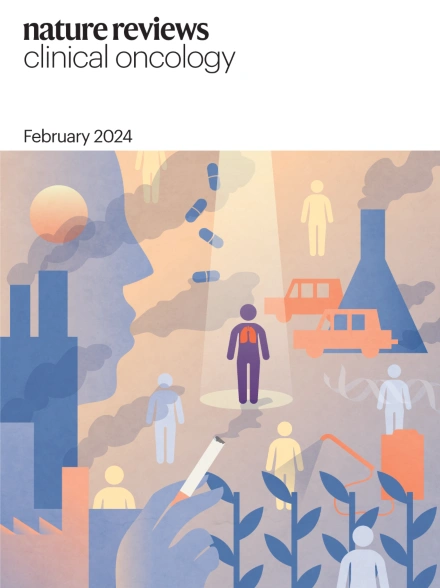The microbiota in radiotherapy-induced cancer immunosurveillance
IF 82.2
1区 医学
Q1 ONCOLOGY
引用次数: 0
Abstract
Radiotherapy has an established role in the clinical treatment of patients with a variety of cancers owing to the ability to preferentially kill malignant cells mostly while sparing their non-malignant counterparts. Results from phase I–II trials also suggest that radiotherapy can have therapeutically relevant immunostimulatory effects, especially when combined with immune-checkpoint inhibitors. Over the past two decades, evidence has emerged showing that intestinal microbial communities have a major influence on the immunological tonus of patients with cancer and can influence sensitivity to various immunotherapies, including immune-checkpoint inhibitors and chimeric antigen receptor T cells. Here, we critically discuss the effects of such microbial ecosystems on radiotherapy-induced toxicities and tumour-targeting immune responses, with a focus on the clinical potential of these relationships for predictive and therapeutic clinical applications. Radiotherapy has an established role in the treatment of many patients with cancer, with evidence suggesting that this modality can also have immunostimulatory effects in certain scenarios. More recently, evidence has emerged supporting a role of the microbiome in influencing the incidence and severity of toxicities in patients receiving radiotherapy as well as in mediating possible synergy with other therapeutic interventions, including immunotherapy. In this Review, the authors explore the clinical potential of these emerging relationships.


放射治疗诱导的癌症免疫监测中的微生物群
放疗在各种癌症患者的临床治疗中已经确立了作用,因为它能够优先杀死恶性细胞,同时保留非恶性细胞。I-II期试验的结果也表明,放射治疗可以具有治疗相关的免疫刺激作用,特别是与免疫检查点抑制剂联合使用时。在过去的二十年中,有证据表明肠道微生物群落对癌症患者的免疫张力有重要影响,并可以影响对各种免疫疗法的敏感性,包括免疫检查点抑制剂和嵌合抗原受体T细胞。在这里,我们批判性地讨论了这些微生物生态系统对放射治疗诱导的毒性和肿瘤靶向免疫反应的影响,重点关注这些关系在预测和治疗临床应用中的临床潜力。
本文章由计算机程序翻译,如有差异,请以英文原文为准。
求助全文
约1分钟内获得全文
求助全文
来源期刊
CiteScore
99.40
自引率
0.40%
发文量
114
审稿时长
6-12 weeks
期刊介绍:
Nature Reviews publishes clinical content authored by internationally renowned clinical academics and researchers, catering to readers in the medical sciences at postgraduate levels and beyond. Although targeted at practicing doctors, researchers, and academics within specific specialties, the aim is to ensure accessibility for readers across various medical disciplines. The journal features in-depth Reviews offering authoritative and current information, contextualizing topics within the history and development of a field. Perspectives, News & Views articles, and the Research Highlights section provide topical discussions, opinions, and filtered primary research from diverse medical journals.

 求助内容:
求助内容: 应助结果提醒方式:
应助结果提醒方式:


